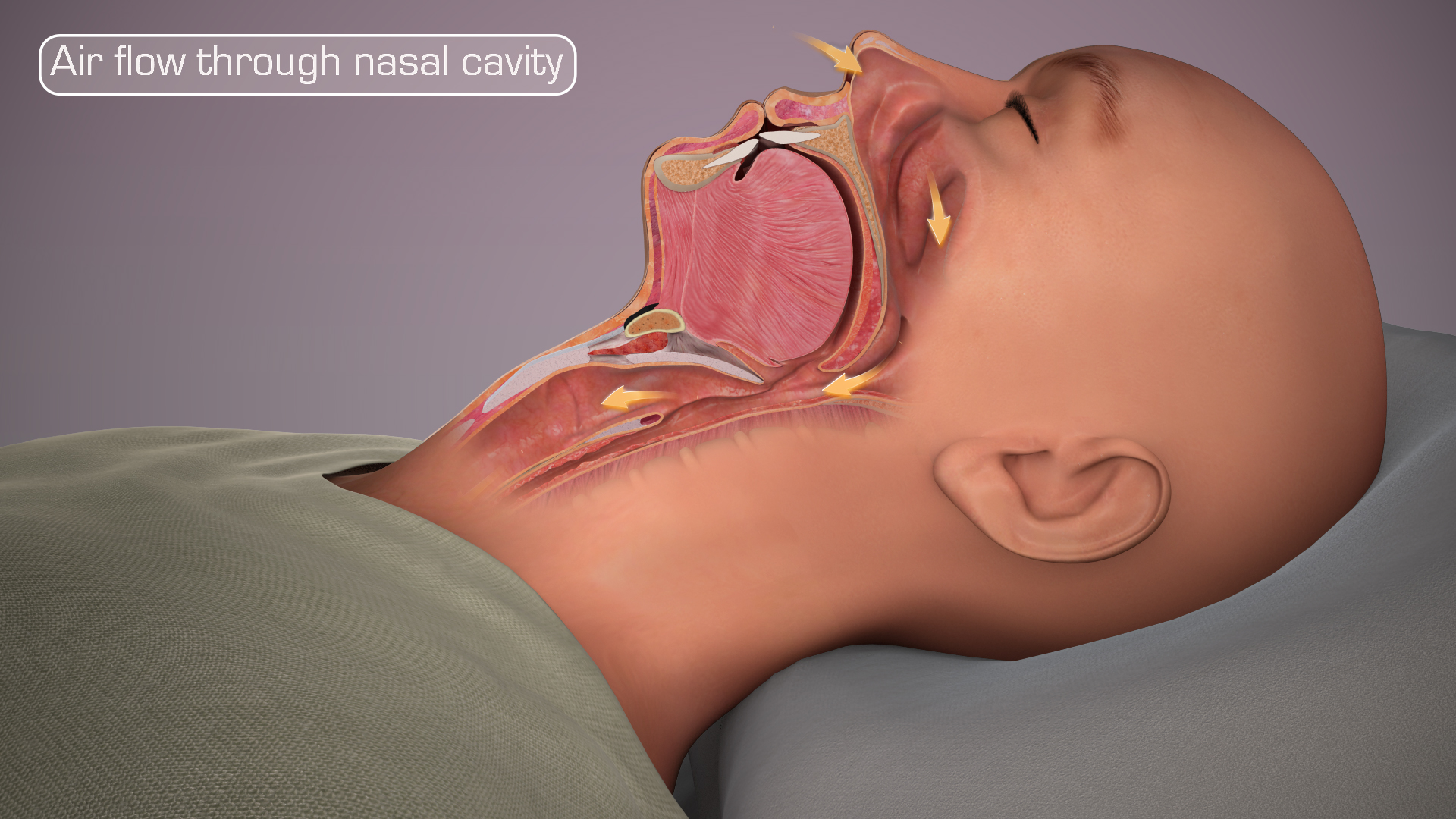Snoring is when the respiratory structures of the body vibrate, producing sound because of obstruction in the air movement during breathing while asleep.While the sound may be soft it mostly is loud and unpleasant. Snoring causes significant psychological and social damage to sufferers and has been linked to an increased risk of stroke and heart attack. It is estimated that roughly 1 in 15 Americans is affected by at least moderate sleep apnea.

A medical animation still showing normal air movement and airway structure. An obstruction in the normal air movement may cause snoring.
Types and Causes
Snoring has multiple effects including sleep deprivation to the person snoring as well as those around him/her as well as as well as daytime drowsiness, irritability and lack of focus. Snores can be classified as tongue based, mouth based (palatal snorers) and obstructive sleep apnea. These different types of snores exude different types of noises.
When the uvula and soft palate are relaxed, it leads to snoring. When these tissues relax, the airway is partially blocked cause irregular airflow and vibrations.Snoring can be caused due to several reasons. This includes throat weakness in which the throat closes during sleep, mispositioned jaw caused because of tension in the muscles, obesity in which fat accumulates in the area around the neck.Other causes include when the nasal passageway is obstructed, the usage of relaxants such as alcohol and other drugs. Sleeping on the back can also lead to tongue dropping and may cause snoring.
Medicine and Treatment
So far, there is no certain treatment to completely cure snoring. While medicines can control some underlying causes such as nasal congestion, they usually are not helpful. As a result doctors recommend change in lifestyle as the first line of treatment. There are also a number of over-the-counter aids such as nasal sprays, nasal strips, lubricating sprays and oral appliances among others.
There are also other ways to control snoring. Orthopedic pillows are designed to support the head and neck in such a way that helps keep the airways unrestricted. Specially made dental appliances are commonly used to treat snoring by pulling the tongue forward. One may also use a Continuous Positive Air Pressure (CPAP) machine to control snoring. Surgery and pillar procedures are also methods to correct snoring. The drugs pseudoephedrine, domperidone, and their combination have also been found to benefit patients suffering from severe snoring. There are also some natural remedies such as exercises to increase muscle tone of the upper airway.
Snoring is extremely common and at least 30% of the adults snore. While it can’t be completely cured, many possible options exist to minimise it.
Disclaimer: The information in no way constitutes, or should be construed as medical advice. Nor is the above article an endorsement of any research findings discussed in the article an endorsement for any of the source publications.
References:

The Paradox of REM Sleep
Sleep may seem simple and static, but, in reality, sleep is a complex and dynamic process. Researchers have discovered distinct, measurable changes in both the body and brain, occurring regularly and predictably throughout the night. Read More..

The Dark Side of Blue Light: Sleep Deprivation and Eye Problems
Your sleep-wake cycle is governed by melatonin, a hormone that tells the body that it is night, helping to make you sleepy. If you delay that signal, you could delay sleep. And if you do that for many years, it disrupts the circadian system, often accompanied by serious health consequences. Read More..








